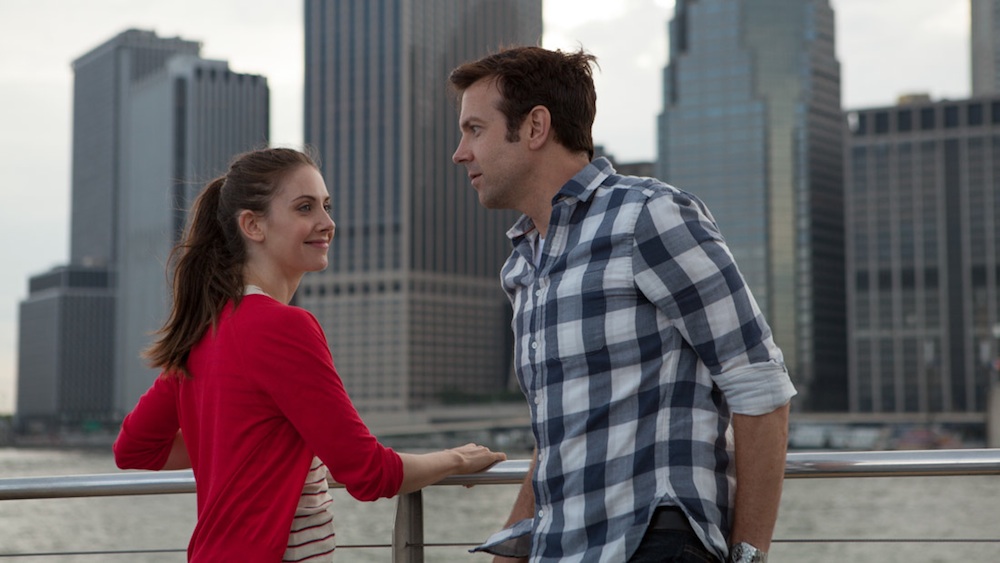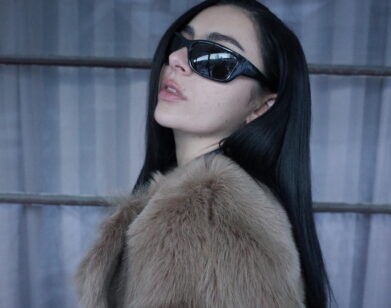Leslye Headland’s Modern Rom-Com

ABOVE: ALISON BRIE AND JASON SUDEIKIS IN SLEEPING WITH OTHER PEOPLE.
“When Harry Met Sally, but for assholes,” is one of the ways writer-director Leslye Headland has described Sleeping with Other People, her follow up to Bacherlorette. In some ways, it’s an apt description. The two main characters, Jake (Jason Sudeikis) and Lainey (Alison Brie), make some ill-advised decisions: Lainey has been hooking up with the same indifferent doctor (Adam Scott) since college while he dates other people; Jake sleeps with all the women he can and when they call him out on his relationship phobia, he tries to talk his way out of it with lines like, “If you want to grow flowers, don’t plant them in the closet.” Together, Lainey and Jake attend a child’s birthday party on Molly. There is also a scene in which Jake shows Lainey how to pleasure herself by fingering an empty bottle of ice tea.
But Sleeping with Other People is also a conventional, optimistic romantic comedy—an affirmation of the possibility of a deep affection between two people that is about more than just sex. And it’s this optimism that makes it special. There are plenty of relationship-for-asshole movies, but when’s the last time you saw a love story that was both funny and reassuring?
We spoke with Headland earlier this week at the Sundance Film Festival, where Sleeping with Other People premiered.
EMMA BROWN: You mentioned Sleeping with Other people was influence by movies like When Harry Met Sally. Some of references are very striking. Where do you draw the line between homage and too much?
LESLYE HEADLAND: It’s funny, that wasn’t a movie that I grew up on. I was actually very sheltered as a kid. I didn’t see it until much later in life, and I think it imprinted itself a bit more in an artistic way, rather than in an emotional way. That movie really solidified what the romantic comedy was, basically for the next 25 years. You look at anything before that and it sort of flounders. I feel like everyone has stolen from that movie. Everyone has been like, “Here are the two leads, here are their best friends, here’s how it’s structured.” For me, the more I could adhere to the tropes of romantic comedy and then subtly turn them on their edge, the more audiences would be accepting of the darker parts of the story—like the fact that she’s having an affair with a man that’s not available; like the fact that he sleeps with women and cheats on them in order to get out of the relationship. The more that I adhered to a structure and a genre everybody has agreed upon, the more I could sneak in the subtly frustrating parts of dating. I really wanted to tell a story about a heroine, Alison Brie’s character, that was really conflicted and not hyper sexualized. I didn’t want to slut shame her. So the more I could say, “See, you know this scene! You’ve seen this scene before! Now she’s having a panic attack!” And everyone’s like, “Oh, okay.” If I just had the panic attack without any sort of reference, I wonder if people would say, “Well, I don’t do that, I don’t have that experience.” But when you see it in a suit that’s familiar, you empathize with it more and you care more about the characters. I think it’s all about how you use it; as long as there’s enough of a new spin on something, you can safely live in homage. You can safely live in a place of “I’m changing this to work for this generation.”
BROWN: I empathized with her!
HEADLAND: Oh good, the panic attack?
BROWN: Yes, but also the idea of being infatuated with someone even though you know objectively they’re not that great. I feel like everyone has been through that.
HEADLAND: Oh absolutely, that’s one of the reasons I wrote the movie. After Bachelorette came out on VOD and was a big success I plunged into this horrific depression. It was the darkest time of my life. I was so depressed, I could barley get out of my house. I had this brief affair with someone, and I developed this weird obsession with him. It was weird because all my friends were like, “He’s so lame.” Which is why Adam [Scott] and I came up with the way his character looks in the film. We wanted him to look very off, and to be so standoffish with no warmth at all. I feel like there must be women—and men, actually—who can relate with the idea of being so low in your life that you’ll accept love in any way that it comes. Even if you’re the girl on the side to someone that you completely idolize, I was willing to take that. I was like, “Yes, absolutely! I’ll just take any crumb of it.” I just think it’s so funny that a big, broad romantic comedy came out of it. You would think that if I was really depressed I would have written something that was devastating: “Here’s the devastating dating landscape and how fucked up everything is.” For some reason what came out was this beautiful rom-com. And the more I’ve been with the movie—in all different aspects of it—I realized that this whole journey for me was about getting back to love. The real kind of love, which was, for lack of a better term, a self-love. I hope when people see the film, it’s not just, “Oh great! I’ve consumed a cupcake!” Which would be like 27 Dresses—a movie I love and I’ve seen a million times but is a cupcake of a movie. [I hope people feel] that they’ve actually had a nice meal. And they leave and they feel happy and like, “Oh my gosh, love does exist even in this weird landscape of Tinder.”
BROWN: It’s not difficult to find a movie that will make you depressed about the state of modern love.
HEADLAND: Yeah, like Blue Valentine. Amazing movie! I saw it with somebody that I was dating at the time; we both watched it and we were like, “That is a bleak landscape.” And Gone Girl, which I just watched again last night—I’ve seen it about seven times—is a wonderful satire on the state of marriage now and what that means. But for me, it was important for me to challenge myself and go, “Is it out there? Is it really achievable? Can I write a love story between two people that’s believable, that has believable stakes, and that at the end of the day, makes you feel inspired and warm inside?” It’s a little bit of a gift to myself, the film. But I also think it’s an act of love to the audience: “I know you guys have been through a lot, I’ve been through a lot too, but there’s no reason to give up. There’s no reason to settle for somebody that doesn’t love you, or hide your true feelings from somebody.” John Cassavetes, in one of my favorite quotes of his, says that humans need love like air and water, they just don’t know how to get it. It’s one of the most tragic things.
BROWN: Do you think you’re generally an optimistic person?
HEADLAND: I think oddly I am. My humor, especially in my personal life, is very cynical and dry, I’m always making jokes about how stupid I am and all that kind of stuff. But I think one of the reasons I’ve been so unlucky in love is that I am this odd optimistic that just assumes, “We must be in love with each other!” And then the other person very calmly informs me that we’re not. [laughs] I think in that area of my life I’m really stupidly optimistic. I go into any sexual situation, or romantic situation, expecting the best and being completely and utterly let down most of the time. Even Bachelorette is oddly optimistic in it’s own weird way. Even though the girls are so awful, I think the moral of that movie is, “You can still navigate this world, as weird as it is, and you’re not going to do it well—you’re probably going to fuck up pretty badly—but what’s the alternative? You just close your doors and never leave home?” You have to get out there and do something with your heart. I love stories about misdirected love or misdirected energy, which is how I feel about the girls in Bachelorette as well as the characters Sleeping with Other People. It was so funny to hear the reviews for Bachelorette: “They’re such awful people!” I was like, “Can’t you see that they’re dying to be loved? They’re so desperate for a hug?”
BROWN: When Lainey and Jake go to the meeting for “love addicts,” the speakers talks about love being a choice.
HEADLAND: Yes, one of my favorite lines in the movie!
BROWN: Do you believe that?
HEADLAND: Absolutely. One of the problems with the romantic comedy genre as it stands right now is the idea that love is sort of this ethereal feeling or this thing that gets bestowed upon you. I absolutely believe it’s a choice—you choose who you love. It starts with that feeling. In the dysfunctional relationships I’ve had—or the relationships with unavailable people that I’ve had—I was driven by that feeling, and sort of unconsciously made the choice to continue being with them. I did a lot of research on sex and love addition, I read this great book called Leaving the Enchanted Forest which is about relationship addition, and I read This Is Your Brain On Sex, about how our sexual fantasies are basically manifestations of our deepest wounds and how we continue to act them out. I think a loving healthy relationship, where sex is a byproduct of that, that was the story that I wanted to tell. These are two people that obviously feel a love for each other, but have to make the choice of whether or not they’re going to be together. They are two separate things. The easy answer is: I do believe it’s a choice, but I think it’s preceded by the feeling —”I’m attracted to this person,” or “I admire this person,” or “this person makes me feel warm and fuzzy” or “this person is supporting to me, they are giving me a lot of compassion and support.” If there’s anything I’ve learned from being 34-years-old, it’s that I cannot base all my behavior and my decisions on feelings. They’re not facts; they come and go. I can be desperately in love with one person one day, and a of couple months later be like, “Wait a minute, I hate this person.”
BROWN: Do you find that people come up to you and tell you about their relationships?
HEADLAND: I hope they do after this film. I feel like I have so much experience. Not because I know anything more, I just have so much experience of throwing myself 110 percent—not only into my sexual relationships or romantic relationships—but also into this movie for example. I put my entire self into this movie, I’m not joking when I say I don’t think I’ve slept eight hours in two years. I’ve been eating, sleeping, and breathing this movie for so long and it is my heart. That means that sometimes it’s cheesy, and sometimes it’s derivative, because my ideas about love come from movies and they come from pop culture. And at the same time, it’s oddly personal. I’m realizing these amazing similarities between the Bachelorette characters and Jake and Lainey, even though they are such different movies. Bachelorette is so dark, so relentlessly like, “Fuck the world. Fuck everyone.” And Sleeping With Other People is much more like, “The world could be great! We don’t know!” But they’re so similar. The girls in Bachelorette as well as Jake and Lainey think that by not making a choice, they will still be okay: “If I only hurt myself, if I never get close to anybody, if I exist in my own little world that I’ve created for myself, then I’ll be okay.” But whatever your feelings are about yourself or about your situation in life start to permeate to everybody around you and it starts to manifest itself in self-destructive behavior, like Lainey being obsessed with the guy that doesn’t love her. Or Jake just constantly sleeping with women and doing that Russian roulette version of dating.
SLEEPING WITH OTHER PEOPLE IS CURRENTLY SCREENING AT THE SUNDANCE FILM FESTIVAL IN PARK CITY, UTAH.
For more from the Sundance Film Festival 2015, click here.






